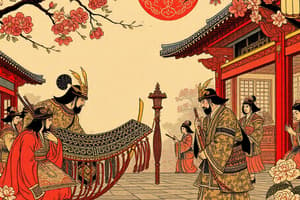Podcast
Questions and Answers
What is the influence of the East Asian monsoon on Japan's climate?
What is the influence of the East Asian monsoon on Japan's climate?
Heavy precipitation along the Pacific coast and dry conditions in the interior.
Which city in Japan is known for its Chinatown and Yokohama Red Brick Warehouse?
Which city in Japan is known for its Chinatown and Yokohama Red Brick Warehouse?
Yokohama
What is the significance of Osaka in Japan?
What is the significance of Osaka in Japan?
It is Japan's third-largest city and a major commercial hub.
Where is Sapporo located and what is it known for?
Where is Sapporo located and what is it known for?
What geographic features contribute to Japan's unique culture and identity?
What geographic features contribute to Japan's unique culture and identity?
What are the four main islands of Japan?
What are the four main islands of Japan?
What is the highest and most iconic peak in Japan?
What is the highest and most iconic peak in Japan?
What percentage of Japan's land area is covered by its mountainous terrain?
What percentage of Japan's land area is covered by its mountainous terrain?
How many distinct seasons does Japan experience?
How many distinct seasons does Japan experience?
What are the three main regions into which Japan's islands are divided?
What are the three main regions into which Japan's islands are divided?
Flashcards are hidden until you start studying
Study Notes
Japan Map: A Comprehensive Guide to Geography and Major Cities
Japan, an archipelago in East Asia, is composed of four main islands - Honshu, Hokkaido, Kyushu, and Shikoku - and numerous smaller islands. The country is located between the Pacific and the Sea of Japan, stretching from 24° to 46° North latitude and 122° to 146° East longitude. Japan's diverse geography, rich history, and economic development have contributed to its unique culture and identity. In this article, we will explore the geographical features and major cities of Japan, providing an in-depth understanding of the country.
Geographical Features
-
Mountains: Japan has over 100 volcanic mountains, with Mount Fuji being the highest and most iconic peak. The country's mountainous terrain covers about 73% of its land area.
-
Islands: Japan is an archipelago, consisting of four main islands and numerous smaller islands. The four main islands are Honshu, Hokkaido, Kyushu, and Shikoku. Japan's islands are divided into three main regions: Hokkaido, Tohoku, and the main island of Honshu, followed by Shikoku and Kyushu, and the Ryukyu Islands facing the Pacific.
-
Climate: Japan's climate varies from subtropical in the south to temperate and subarctic in the north. The country experiences four distinct seasons, with summer being hot and humid, and winter being cold and dry. Japan's climate is influenced by the East Asian monsoon, which results in heavy precipitation along the Pacific coast and dry conditions in the interior.
Major Cities
-
Tokyo: The capital and largest city in Japan, Tokyo, is home to numerous iconic landmarks and attractions, including the Tokyo Skytree, the Sensoji Temple, and the Meiji Shrine.
-
Yokohama: Located just south of Tokyo, Yokohama is Japan's second-largest city and a major port. The city is known for its Chinatown, Yokohama Red Brick Warehouse, and Minato Mirai 21 district.
-
Osaka: Osaka is Japan's third-largest city and a major commercial hub. The city is known for its Osaka Castle, Universal Studios Japan, and Dotonbori, a popular entertainment district.
-
Nagoya: Nagoya is Japan's fourth-largest city and a significant industrial center. The city is home to the Nagoya Castle and the Toyota Museum, showcasing the history of Japan's automotive industry.
-
Sapporo: Located on the northern island of Hokkaido, Sapporo is Japan's fifth-largest city. The city is known for its Sapporo Beer Museum, the Sapporo Clock Tower, and the Sapporo Snow Festival, an annual winter event featuring ice sculptures.
Conclusion
Japan's diverse geography, including mountainous terrain, volcanic activity, and numerous islands, contributes to its unique culture and identity. The country's major cities, each with their own distinct character and attractions, provide a glimpse into the rich history and economic development of Japan. From the iconic landmarks of Tokyo to the scenic beauty of Sapporo, Japan offers a wealth of experiences for visitors and residents alike.
Studying That Suits You
Use AI to generate personalized quizzes and flashcards to suit your learning preferences.




